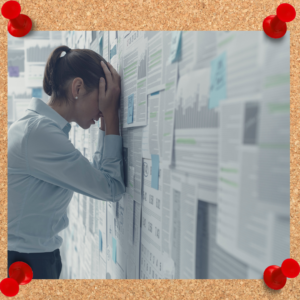Learning from failure is essential! Why? Because everyone fails! Don’t believe those picture-perfect Instagram images or the cocky coworker who claims perfection. It isn’t real. Failure is not only typical (and expected); it’s necessary. How would we grow if we never met a challenge that stumped us? We wouldn’t!
Without failure, we’d never know what we are capable of because we likely wouldn’t try anything we might fail at. Imagine living a life like that. I wouldn’t want it. A life avoiding failure would mean never getting married (because I could fail at that) – or never having kids (because I definitely fail at parenting a lot) – or never applying for a great job (because what if I actually get hired and have to prove that I can do the work).
Learning from failure requires a lot of effort, so let’s start with the basics.

What is Failure to You?
The dictionary definition of failure is “a lack of success.” While that definition is technically true, it is also disheartening. In this definition, failure is the opposite of success – but that isn’t exactly true.
Failure is a paver on the path to success. You can’t hop over it or move around it. This is one that you have to step on. How you respond to failure is what’s telling.
Failure is different for everyone. Some people make failure out to be the end of the world. Others breeze by failure without much thought. Some focus on failure while trying to move forward, while others focus more on learning from failure.
Why is Learning from Failure Important?
Let’s imagine a leader who ignores failure. It happens, everyone knows it, and they simply never discuss it or look at what caused it. A more specific example could paint a better picture.
You may know the name Elizabeth Holmes. Holmes is the former CEO and founder of Theranos, now serving an 11-year prison sentence for fraud. She promised blood testing technology and made deals with various retail stores to put it in their locations, but that technology never existed.
It is believed that Holmes and Theranos tried to deliver what was promised but ignored failures and used blood testing technology already on the market. Over more than a decade, Holmes and her company received nearly $1 billion in investments and provided false promises to her investors. Whistleblowers informed a journalist of the truth – that Holmes was not learning from the technology’s failures and instead promising things that Theranos did not have.
Perhaps if Holmes had crafted a culture of learning from failure, she would have been able to deliver on her promises to all those investors. Learning from failure is not only good – it’s necessary.
Crafting a Culture of Learning from Failure
Have you ever felt that making a mistake was an absolute no-no? I have! One mistake and you’re out is still a culture that some people fear – and for good reason. Although some believe this culture sets the performance standard, it actually forms a hush-hush culture. When a mistake is made, people work harder to hide it than they do to learn from it.
A zero-tolerance for failure is a culture that is difficult to work for. It is essential to make the distinction between failure and danger. An individual who committed a crime is dangerous to the organization and potentially the employees. Sexual harassment is not a failure – that’s a danger. Knowing where to draw the line is vital.
However, you must create a culture where mistakes are tolerated and considered a lesson. Invite workers to bring problems to those who can help solve them. Ensure that corrective action is not the immediate reaction but answering the question, “What can I learn from this failure?”
When employees feel confident they will not be fired or reamed for making a mistake, they are more likely to feel comfortable sharing their failures and lessons learned. Learning from failure is easiest when it is encouraged.

Ditch the Blame
When a failure occurs, it can be tempting to search for a place to put the blame.
Have you been there? I know I have.
A few years ago, I went out to our family vehicle to run a few errands, and the key fob wouldn’t unlock the doors – dead battery. For whatever reason, my husband and I discussed who was at fault for leaving an interior light on. He thought I was the last one to drive it, and I thought the opposite.
Looking back on that, I think how ridiculous that we even had that talk. Knowing who was at fault didn’t solve the problem, nor did it cultivate a loving attitude that said, “We can admit our faults without worry.”
Full disclosure, it became clear pretty quickly that I was at fault. My 6′ 5 husband drives with the seat all the way back, and it sat in the perfect position for my 5 ‘6 frame. Oops. Just so you know, I did apologize!
No matter who is at fault – even when it’s you – blame doesn’t help. Blaming yourself will not turn back the clock nor fix what’s happening as a result. Let’s skip the blame and jump right into learning from failure, shall we?
Failure Has a Scale
Failure is a daily occurrence for me, so I’m guessing it’s also an everyday thing for others. However, it is vital to remember that the many failures throughout my day are not all on the same scale. If I mess up my healthy eating plan with a few cookies before bed, I won’t beat myself up for the rest of the month. If I crashed my car while trying to eat a big, juicy burger, that’s a different story.
But the scale I want to dig into requires asking a few questions.
Was it Preventable?
Preventable failures are some that often cause a lot of regrets. You might ask yourself, “Why didn’t I do this?” and “How could I have forgotten that important part?” There may be steps that could prevent the failure in the future.
To determine the best way to prevent future failures of the same caliber, we must figure out if it is a failure that could have been prevented and how to do so in the future.
Learning from preventable failures will help you prevent the same types of mistakes in the future.
Was it Avoidable?
Where preventable failures are about putting systems in place before the failure occurs again, avoidable failures are more about seeing the failure coming and sidestepping. An example that comes to mind is the Deepwater Horizon oil spill in 2010. If you’re unfamiliar with the story, BP was drilling in deeper waters than ever before – and decided to do so while cutting corners to save time and money – that’s the preventable part.
The avoidable part of the failure came when BP ignored the warning signs that the well had issues. For instance, workers on the rig reported leaks in the blowout preventer, a vital component designed to prevent the uncontrolled release of oil and gas. There were also signs that a build-up of pressure was beginning, which can result in problems with the seal intended to prevent a leak.
When employees noticed and reported these problems, BP should have taken action immediately to avoid disaster. As you likely know, BP did nothing to stop what would come. An explosion leaked an estimated 210 million gallons of oil into the Gulf of Mexico, killing 11 people onboard. An utterly avoidable disaster – had BP and its contractors taken action when informed of the concerns.
Learning from failure requires knowing if the failure was avoidable.
Was it Valuable?
Have you ever viewed a failure as valuable? It can be difficult, but Spencer Silver did just that when an adhesive for the aerospace industry failed to do what it was created to do. Instead of giving up, Silver took the failed adhesive to a colleague named Art Fry, and the two developed a product that most people use regularly: the Post-It Note.
Learning from failure makes failure valuable. Ask yourself, was this failure valuable? What can I learn? How can I use it? These questions can change your whole perspective.

How to Spot Failure
Depending on your age, you may remember when Netflix was not a streaming service but a DVD-by-mail service. You could select movie choices online, and like magic, your DVD rental showed up in your mailbox a few days later.
When Netflix decided to create a streaming option as well, the organization thought it would be best to split the company into two – one half (called Quikster) would service the DVD-by-mail customers, and the other would keep the Netflix name and represent the modern streaming service that we know.
People hated the idea.
Netflix listened. They quickly rectified the mistake, and while Netflix no longer offers the DVD-by-mail service, the company has thrived since the CEO made the decision.
How was the original failure spotted? Netflix listened.
The company could have ignored the backlash and went ahead with their plans. They could have said, “You’ll see! It will work!” Instead, they listened to what their customers were saying and made a quick change that likely saved them from more significant issues.
When people talk, we must listen. That’s how we spot failures that can be hard to miss. Of course, many failures will be easy to see – sticking out like a sore thumb. Others, however, might only become apparent much later. Catching mistakes early on is imperative to preventing bigger issues.
So, you must encourage your team to speak up when a failure occurs and celebrate them for doing so. A listening ear is how you discover where people need assistance. Learning from failure can only happen if you know where failure occurs.
Learning From Failure Requires Analysis
Learning from failure is not some magical trick where you are imparted with the wisdom and knowledge of failure geniuses as you sleep. No, learning from failure requires analysis. Learning from failure requires work. Sorry.
The analysis starts with defining the failure and what caused it. Then you must determine how far it’s reached – did it get to accounting? What about HR? Did it harm sales? Know its impact.
You’ll want to think about alternative courses of action that may have mitigated or prevented failure. How effective could the other routes have been?
This is analyzing failure. Then, you can craft a plan to improve your actions and progress.
Fail on Purpose (Sort Of)
Isn’t it odd to think that you’d ever fail on purpose? Did you know that 70% of new businesses fail within ten years? And yet, when people set out on their journey to entrepreneurial success, they never imagined that they would be one of that 70%.
Knowing that most businesses fail, you go into it knowing you’re more likely to fail. You almost fail on purpose. But you have to…because if you didn’t, you would be playing it safe. You can’t be one of the 30% of successful entrepreneurs when you don’t try to fail in the first place.
Learning from failure means you must fail to begin with. And you will.

What Can You Learn from Failure?
There is so much to learn from failure. While the first thing that comes to mind is what not to do, there can be more to it.
You can learn that it’s okay to start again and choose a new adventure. If you didn’t read those books as a kid, you might not get the reference, but the message is still the same.
Let me tell you, anyway: the Choose Your Own Adventure books gave the reader a choice in what happens next. Choose one action, and you’d flip to a particular page. Choose the other action, and you’d go to a different page. It was an interactive reading experience that gave the reader control and choices…and you could go back and re-do the option when you wanted a different result.
When you want a different result, go back and choose differently.
You also become more creative when your initial plans don’t work out. Thinking outside the box might be more common when the first route fails. But, to choose a better course, you must think about what went wrong in the initial attempt. Learning from failure is a process.
Learning from failure provides a real-life, interactive lesson that you can choose to change as you gain more experience.
How To Beat Failure
Do you ever experience a full stop after you’ve missed the mark? You wanted to deliver a fantastic presentation and win a new account but stumbled over your words and never wanted to make a presentation again. Or, you set a goal to run a half marathon in six months, but six months are up, and you can’t get past mile 10, so you put away your running shoes.
I’m sure most people have been there. Fortunately, there are a few steps you can take to beat failure. You don’t have to accept failure as the end. Learning from failure means you have to keep going, so let’s learn how to overcome it.
Don’t quit.
How tempting is throwing in the towel when something doesn’t go your way? Or, maybe you’re one of those who refuse to give up until you get it right. And that’s where the second kind of person beats failure.
They don’t quit. Those people keep analyzing, evaluating, and making changes to the plan until something works. And that’s how it should be: learning from failure.
Change your thinking.
Your mindset is vital to your success. I can’t. I couldn’t do it before; I can’t do it now. This mindset says you won’t improve, change, or grow, so why try?
Instead, try changing your thoughts to this: I’ll improve today and be better tomorrow. Then, I’ll improve again tomorrow and be better the following day. Keep growing. This person will thrive. This person is learning from failure.
Focus on you.
Your mental health matters – and we can beat ourselves up when failure is present. We don’t need to. Instead, focus on developing mental strength. When failure comes (and it will), leaders can approach the situation with a strong mind and confidence in moving forward.
Practice mindfulness, self-awareness, and keep moving forward. Learning from failure requires you to be present and available. Don’t skip your personal care – you might need it!

Quotes on Learning from Failure
These quotes make learning from failure especially convincing!
- “I have not failed. I’ve just found 10,000 ways that won’t work.” – Thomas Edison
- “Success is not final, failure is not fatal: It is the courage to continue that counts.” – Winston Churchill
- “Failure is only the opportunity to begin again, this time more intelligently.” – Henry Ford
- “Failures, repeated failures, are finger posts on the road to achievement. One fails forward toward success.” – C. S. Lewis
- “You build on failure. You use it as a stepping stone. Close the door on the past. You don’t try to forget the mistakes, but you don’t dwell on them. You don’t let it have any of your energy, or any of your time, or any of your space.” – Johnny Cash
- “I’ve missed more than 9,000 shots in my career. I’ve lost almost 300 games. 26 times, I’ve been trusted to take the game-winning shot and missed. I’ve failed over and over and over again in my life. And that is why I succeed.” – Michael Jordan
- “It’s failure that gives you the proper perspective on success.” – Ellen DeGeneres
- “Success is stumbling from failure to failure with no loss of enthusiasm.” – Winston Churchill
- “There is no innovation and creativity without failure. Period.” – Brené Brown
- “The only real mistake is the one from which we learn nothing.” – Henry Ford
- “Failure is a detour, not a dead-end street.” – Zig Ziglar
- “We learn from failure, not from success!” – Bram Stoker
- “Success is not the absence of failure; it’s the persistence through failure.” – Aisha Tyler
- “You may encounter many defeats, but you must not be defeated. In fact, it may be necessary to encounter the defeats, so you can know who you are, what you can rise from, how you can still come out of it.” – Maya Angelou
- “Don’t let yesterday take up too much of today.” – Will Rogers
- “Our greatest glory is not in never falling, but in rising every time we fall.” – Confucius
- “If you’re not failing every now and again, it’s a sign you’re not doing anything very innovative.” – Woody Allen
- “I can accept failure; everyone fails at something. But I can’t accept not trying.” – Michael Jordan
- “Only those who dare to fail greatly can ever achieve greatly.” – Robert F. Kennedy
- “Failure is simply the opportunity to begin again, this time more intelligently.” – Henry Ford
Learning from Failure as a Habit
With mess-ups being a common component of life, leaders must get in the habit of learning from failure. When you fail to learn from failure, you add another failure to the list that needs changing. So, start developing that leadership habit now – learning from failure must become your standard practice.